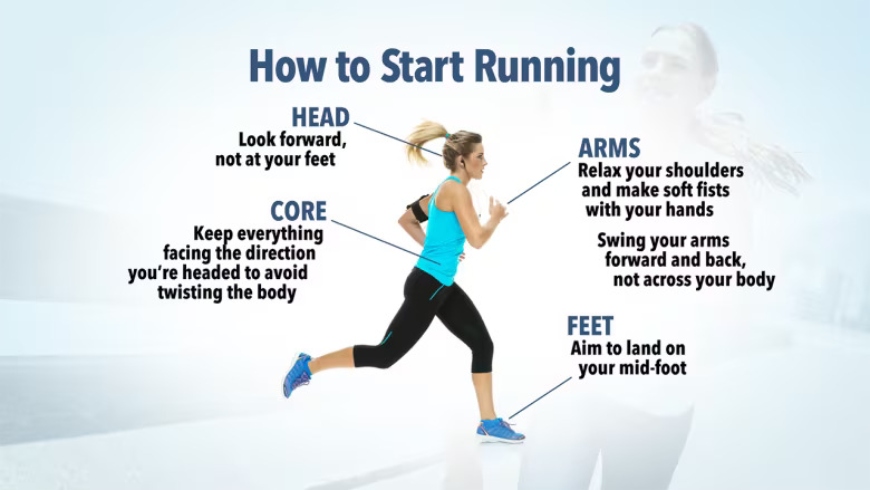Running Tips For Beginners - Practical Tips For Getting Started
Discover essential running tips for beginners - from setting goals to proper gear, form, and staying motivated. Get started today!
Author:Karan EmeryReviewer:Daniel JamesFeb 16, 202419.5K Shares264.3K Views

Embarking on a running journey as a beginner can be both exhilarating and daunting. Whether aiming to improve fitness, lose weight, or simply enjoy the outdoors, starting on the right foot is crucial. This guide offers practical running tips for beginners, focusing on building a solid foundation, preventing injury, and staying motivated.
Here are some of the running tips for beginners you must consider:
Setting Realistic Goals
Before lacing up your shoes, establish clear and achievable goals. Start with realistic expectations based on your current fitness level and gradually increase the intensity and duration of your runs as you progress. Whether it's completing a certain distance, improving endurance, or participating in a race, having specific goals will keep you motivated and accountable.
Investing In Proper Gear
Quality running gear can make a significant difference in your comfort and performance. Invest in a pair of supportive running shoes that suit your foot type and running style. Additionally, moisture-wicking clothing, breathable socks, and a good sports bra (for women) can enhance your running experience by reducing chafing and discomfort.
Find Safe And Traffic-free Paths
Find some routes that you can consistently travel in all types of weather, ideally without any traffic, and schedule them ahead of time. If you must run on the road in the absence of a footpath, however, make sure you are moving against the flow of traffic. If you are nearing a blind turn, however, you should switch sides until it is safe to recross. When using a treadmill, make sure you travel at a pace that allows you to run naturally. Holding onto the handrails will cause you to move awkwardly and increase your risk of injury.
Starting Slowly And Consistently
Avoid the temptation to push yourself too hard, too soon. Begin with a manageable pace and distance, incorporating walk breaks if needed. Gradually increase the duration and intensity of your runs over time to build endurance and prevent overuse injuries. Consistency is key, aim for regular, scheduled runs to establish a sustainable routine.
Paying Attention To Form
Proper running form can help prevent injuries and improve efficiency. Focus on maintaining an upright posture, relaxed shoulders, and a slight forward lean from the ankles. Land softly on your midfoot or forefoot, rather than heel-striking, and aim for a cadence (steps per minute) of around 160-180 to reduce stress on your joints.
Make Your Running Social
You can become terrified at the thought of conversing while you're racing, panting in anticipation. However, running alongside a companion can transform a tedious run into a leisurely stroll, even if you reserve the real conversation till after.
Join a running club or locate a running partner using the online "find a club" tool provided by British Athletics. These groups welcome runners of all ages and skill levels, and many provide beginner-friendly sessions. They are not only for speedsters.
At your neighborhood parkrun, you might also make acquaintances because runners enjoy talking about running. Additionally, it's contagious to be around others that enjoy running and have a positive outlook on it.
Listening To Your Body
Pay attention to signals from your body and adjust your running routine accordingly. It's normal to experience some muscle soreness and fatigue, especially when starting out, but sharp or persistent pain could indicate an injury. If you're feeling excessively tired or experiencing discomfort, take a rest day or consider cross-training activities like cycling or swimming.
Run Whenever It's Most Convenient For You
The time of day that works best for you and when you have the most chance of finishing is when you should run. It is often easier for many runners to fit in a training first thing in the morning. Find a regular time that works for you, though, if that doesn't fit into your everyday plan. Next, and most importantly, reserve this time slot for running. Remember your equipment, avoid being sidetracked, and refrain from looking for an excuse (which are often quite simple to find).
Incorporating Strength Training
Strength training plays a vital role in injury prevention and performance improvement for runners. Include exercises that target key muscle groups, such as the legs, core, and hips, to build strength, stability, and balance. Bodyweight exercises, resistance bands, and free weights are all effective options for enhancing your running capabilities.
Staying Hydrated And Fueling Properly
Hydration and nutrition are essential aspects of a successful running routine. Drink water regularly throughout the day to stay hydrated, and consider carrying a water bottle or hydration pack during longer runs. Fuel your body with a balanced diet rich in carbohydrates, protein, and healthy fats to support energy production and recovery.
Go Slowly On Hills
No matter your skill level, hills are deadly, so don't feel bad about going slower through them. The secret to conquering hills is to concentrate on exerting the same amount of energy at both elevations and descents, note that this means the same effort, not the same speed. To bring your heart rate under control, slow down or take a walk break if you start to have trouble breathing.
Rest And Recovery
Rest and recovery are integral parts of any training program. Allow your body adequate time to recover between runs, especially after intense or long-distance sessions. Incorporate rest days into your schedule and prioritize activities that promote relaxation and muscle recovery, such as stretching, foam rolling, and quality sleep.
Staying Motivated
Maintaining motivation is key to sustaining a running habit. Find ways to keep your runs enjoyable and engaging, whether it's exploring new routes, listening to music or podcasts, running with a friend or group, or setting rewards for reaching milestones. Celebrate your progress and remember that consistency and perseverance are the keys to long-term success.
Other Exercises Are Also Crucial
A lot of runners consider any form of training that doesn't involve running to be a waste of time. They are not correct. Strength and conditioning exercises, as well as core work, are crucial for preventing injuries and enhancing running form and economy. For example, a strong core can assist keep us from slumping forward when we get weary during a longer run.
The greatest muscle group in your body, the glutes, are the main hip muscles, and a lot of running-related aches and pains can be directly linked to the glutes' lack of proper function. Spending five minutes a day on specific exercise can have a big impact.
A basic combination of planks, side planks, and crunches may strengthen your core, while squats and bridges are excellent for the glutes. There are lots of applications and online tutorials available to assist.
Running Tips For Beginners - FAQs
What Are The Running Tips For Beginners?
- Put on comfortable clothing that won't restrict your movement and supportive shoes.
- Prior to and following each run, warm up and cool down.
- In the hours before and after running, sip more water.
- Avoid going overboard.
- After every run, give your body a 24-48-hour recovery period.
How Can Beginners Set Realistic Running Goals?
Beginners should establish clear and achievable goals based on their current fitness level and gradually increase the intensity and duration of their runs over time.
How Should Beginners Start Their Running Routine?
Beginners should start with a manageable pace and distance, incorporating walk breaks if needed, and gradually increase the duration and intensity of their runs over time.
What Is Proper Running Form For Beginners?
Proper running form for beginners includes maintaining an upright posture, relaxed shoulders, a slight forward lean from the ankles, and landing softly on the midfoot or forefoot.
How Can I Increase My Running Stamina?
You can target this particular area at home with basic workouts like single leg squats, step-ups, lunges, and leaps. To improve your running endurance, you must dedicate yourself to your training. Gains will only occur if you surpass your previous performance, as with anything.
What Should Beginner Runners Eat And Drink?
Beginner runners should stay hydrated by drinking water regularly throughout the day and fuel their bodies with a balanced diet rich in carbohydrates, protein, and healthy fats to support energy production and recovery.
What Are The 5 Basic Running Techniques?
The five fundamental phases of good running form, posture, lean, pull, shift, support, and land, and how to incorporate them into your running should be understood. Being an efficient runner requires having the right running posture.
Conclusion
Embarking on a running journey as a beginner requires patience, dedication, and a willingness to learn and grow. By setting realistic goals, investing in proper gear, starting slowly and consistently, paying attention to form, listening to your body, incorporating strength training, staying hydrated and fueled, prioritizing rest and recovery, and staying motivated, you can establish a sustainable running routine that supports your health and fitness goals. Remember to enjoy the process and celebrate your achievements along the way with these running tips for beginners.
Jump to
Setting Realistic Goals
Investing In Proper Gear
Find Safe And Traffic-free Paths
Starting Slowly And Consistently
Paying Attention To Form
Make Your Running Social
Listening To Your Body
Run Whenever It's Most Convenient For You
Incorporating Strength Training
Staying Hydrated And Fueling Properly
Go Slowly On Hills
Rest And Recovery
Staying Motivated
Other Exercises Are Also Crucial
Running Tips For Beginners - FAQs
Conclusion

Karan Emery
Author
Karan Emery, an accomplished researcher and leader in health sciences, biotechnology, and pharmaceuticals, brings over two decades of experience to the table. Holding a Ph.D. in Pharmaceutical Sciences from Stanford University, Karan's credentials underscore her authority in the field.
With a track record of groundbreaking research and numerous peer-reviewed publications in prestigious journals, Karan's expertise is widely recognized in the scientific community.
Her writing style is characterized by its clarity and meticulous attention to detail, making complex scientific concepts accessible to a broad audience. Apart from her professional endeavors, Karan enjoys cooking, learning about different cultures and languages, watching documentaries, and visiting historical landmarks.
Committed to advancing knowledge and improving health outcomes, Karan Emery continues to make significant contributions to the fields of health, biotechnology, and pharmaceuticals.

Daniel James
Reviewer
Daniel James is a distinguished gerontologist, author, and professional coach known for his expertise in health and aging.
With degrees from Georgia Tech and UCLA, including a diploma in gerontology from the University of Boston, Daniel brings over 15 years of experience to his work.
His credentials also include a Professional Coaching Certification, enhancing his credibility in personal development and well-being.
In his free time, Daniel is an avid runner and tennis player, passionate about fitness, wellness, and staying active.
His commitment to improving lives through health education and coaching reflects his passion and dedication in both professional and personal endeavors.
Latest Articles
Popular Articles

